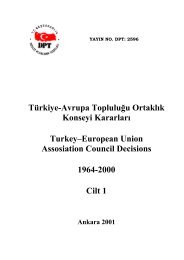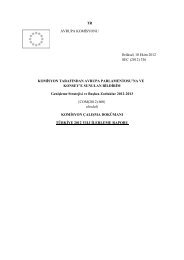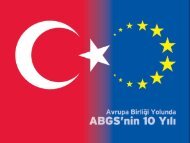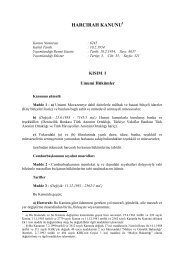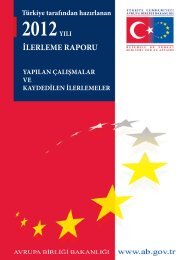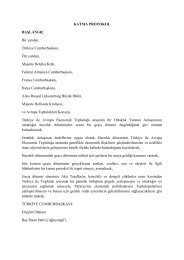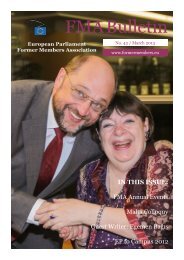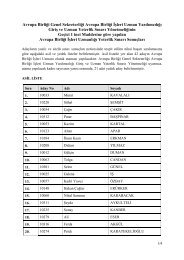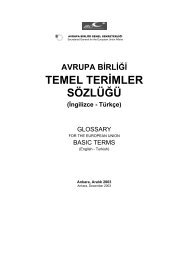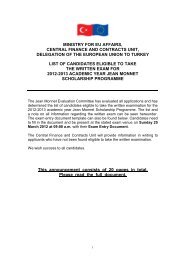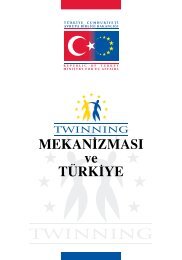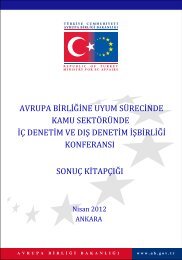2010 ilerleme raporu - Avrupa BirliÄi BakanlıÄı
2010 ilerleme raporu - Avrupa BirliÄi BakanlıÄı
2010 ilerleme raporu - Avrupa BirliÄi BakanlıÄı
You also want an ePaper? Increase the reach of your titles
YUMPU automatically turns print PDFs into web optimized ePapers that Google loves.
enefits from previous years of fiscal consolidation and overall medium-term fiscal<br />
sustainability, and to achieve strong, sustained and balanced growth. Privatisation has<br />
advanced, albeit at a slower pace due to the global economic environment. The financial<br />
sector has shown remarkable strength thanks to earlier reforms. Investment picked up strongly<br />
and some limited progress was made in upgrading the country's human and physical capital.<br />
Turkey was able to partly diversify its trade towards new markets, thereby alleviating to a<br />
certain extent the impact of the crisis. Trade and economic integration with the EU remained<br />
high.<br />
However, external imbalances and financing needs have been growing significantly on the<br />
back of resuming growth and although access to external finance remained unproblematic.<br />
Inflationary pressures increased considerably, chiefly because of pressures stemming from<br />
energy inputs and buoyant economic activity. Making more progress with fiscal transparency,<br />
strengthening the inflation targeting framework and preserving financial stability remain key<br />
conditions in order to minimize the risks of a boom-bust scenario. The unemployment rate<br />
remains higher than its pre-crisis levels and demographic factors are expected to keep<br />
unemployment high in coming years. The low capacity to create new jobs is clearly linked to<br />
a skills-mismatch between labour demand and supply, as well as excessive labour market<br />
regulation. There are obstacles to market exit and bankruptcy proceedings are relatively<br />
cumbersome. The crisis has further complicated the access of SMEs to finance. The legal<br />
environment, and in particular court procedures, continue to pose practical challenges and<br />
create obstacles to a better business environment. The current product market regulation and<br />
the persisting lack of transparency on the allocation of state aids are not conducive to<br />
improving the business climate. The informal economy remains an important challenge.<br />
Turkey continued improving its ability to take on the obligations of membership. Progress,<br />
at times uneven, was made in most areas. Alignment is advanced in certain areas, such as the<br />
free movement of goods, intellectual property rights, anti-trust policy, energy, enterprise and<br />
industrial policy, consumer protection, statistics, Trans-European Networks, and science and<br />
research. Efforts need to continue to pursue alignment in areas such as environment, company<br />
law, public procurement and right of establishment and freedom to provide services. As<br />
regards the Customs Union, alignment needs to be completed. A number of longstanding<br />
trade irritants remain unresolved, such as conformity assessments checks, import and export<br />
licensing requirements, IPR effective enforcement, requirements for the registration of new<br />
pharmaceutical products and tax discriminatory treatment. It is essential that Turkey fully<br />
implements the Customs Union and removes a large number of obstacles affecting EU<br />
products that are in free circulation. For most areas it is crucial that Turkey improves its<br />
administrative capacity to cope with the acquis.<br />
With regards to free movement of goods legislative alignment is quite advanced, but limited<br />
progress can be reported. Technical barriers to trade continue to exist hampering free<br />
circulation of goods and new barriers have been added. Little progress has been made in the<br />
area of freedom of movement for workers, for which alignment is at an early stage. Alignment<br />
in the areas right of establishment and the freedom to provide services is at an early stage.<br />
Very limited progress can be reported as regards mutual recognition of professional<br />
qualifications. No progress has been recorded in the fields of services and establishment. On<br />
free movement of capital progress was made, in particular on alignment with the acquis in the<br />
area of the fight against money laundering. The legal framework against financing of<br />
EN<br />
11<br />
EN




